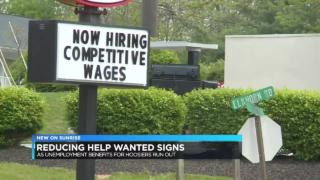
Help Wanted: It’s Still a Labor Market
It’s been amazing to read all the social and traditional media comments about all the help wanted signs. Amateur economics professors pipe in just like Monday morning quarterbacks to give their two cents worth. However, what I’ve noticed, is the slant is almost 100% against workers. I’ve heard the older, retired folks use negative adjectives like “lazy” and “entitled” with a story from their experience as entry-level workers fifty or sixty years ago. For those who struggle with math, it would be the folks working in the 60s and 70s.
Labor Market Was Much Different in the 1970s
You can’t compare the times due to technology and the concentration of wealth incurred since then. Since the government works for the oligarchy, we’ve moved past the globalization of outsourcing jobs to giant monopolies – trans-national companies spanning the globe to reach maximum efficiencies with the approval of the nation-states where they operate. These companies have more power than nations. There were no Walmarts in the 60s and 70s who forced all their vendors to head toward China after writing preferable trade deals for the politicians they owned.
For decades, the oligarchs have called the shots and eliminated almost all unions. Many states have doubled down like Indiana by making it almost impossible to form a union. When threatened with a union, Amazon hired CIA operatives to infiltrate the union organizers so they could fire the “troublemakers.” In addition, Amazon used its billions to run major propaganda programs against the union.
Negotiating Power Has Been in Employers Favor for Decades
In other words, the oligarchs have been oppressing the working class for decades and have paid big money to make sure it stays that way. Even with all the obvious facts pointing in their favor, economics professors still call the employee-employer relationship a “labor market” comprised of two equal and rational agents. Just a couple of years ago, one job opening was met with 300-400 applications. It’s been that way for decades as well.
Then, along comes a virus of still unknown origins. Finally, we experience a global pandemic that impacts every single country. Global supply chains are disrupted as employees get sick and businesses close for quarantine purposes. Quickly, the government bails out the financial oligarchy and remaining oligarchs first. Then comes workers and communities. Notice the priorities. Wall Street has had a continuous stream of support from the Fed since they tanked the global economy in 2008. I’ve heard anywhere from $14-19 trillion, and they still are getting $120 billion per month.
Rational Agents Still Have a Choice
Meanwhile, the small and medium-sized businesses needed to reopen. Restaurants and hospitality needed the economic engine to be turned back on. The problem is they all forgot about the pandemic and the fact many Americans refused to get vaccinated, so now we’re getting hit by variants of the original virus. Some rational agents were workers who got federal and state unemployment benefits, so going back to work wasn’t a priority. Other rational agents had to stay home due to childcare issues or taking care of sick parents. Some rational agents refused to work in certain industries subjected to the virus because their employers didn’t offer health benefits.
This brings me back to the beginning of this article. Whatever these workers had for not reentering the job market was their choice based on their individual factors. Why are we calling them “lazy” or “entitled?” Many employees upskilled and took better jobs during the pandemic. Some industries have been abusing workers for decades, and they are now paying the price. I can search a job board or jot down names of employers who have Help Wanted signs. Quite a few of the names were there before the pandemic. Maybe there’s a good reason workers aren’t rushing back to those employers. Word gets around fast on social media.
Time to Rethink the Labor Market Compact
There was a great article in the World Economic Forum for Labor Day this past weekend that had a great perspective on the issues with our labor market. Quite a bit different than the opinions I read on Facebook and LinkedIn. It was titled, “This Labor Day we need to rethink the employer-employee compact.”
To lure workers back to the workplace, employers need to start thinking about the whole employee, the life they lead and the values they hold, not just the individual they see for an eight hour day or a dinner or lunch shift. Employers need to be partners in the lives of their employees – both inside and outside of work (physical or virtual).
The great awakening of the modern workforce, where employees seek a better work life balance, greater flexibility, higher wages and place greater emphasis on their personal health and wellbeing, is a cultural and economic shift that’s here to stay. We need a new compact to reflect this new reality. It’s the right thing to do for our economy, and the long-term growth that we need. And as we contemplate the meaning of Labor Day, it’s the right thing to do to honour the value of America’s workforce.
https://www.weforum.org/agenda/2021/09/labor-day-rethink-the-employer-employee-compact/






